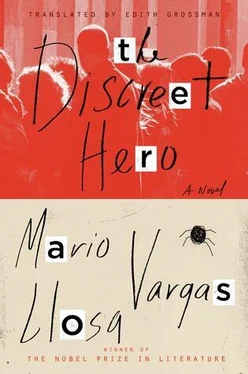“I still don’t believe all this is happening,” Lucrecia repeated, as she and Rigoberto were returning home to Barranco along the Costanera. “Doesn’t it seem like a game, a play, a masquerade? Well, I don’t know what, but not something that actually happens in real life.”
“Yes, yes, you’re right,” her husband agreed. “This morning’s show seemed unreal to me. Well, now Ismael and Armida are leaving to have a good time. And be free of what’s coming, what’s going to happen to those of us who stay here, I mean. The best thing would be if we left soon for Europe. Why not move up our trip, Lucrecia?”
“No, we can’t, not while we have this problem with Fonchito,” said Lucrecia. “Wouldn’t you feel bad about going away now, leaving him alone, when his mind’s so confused?”
“Of course I would,” Don Rigoberto corrected himself. “If it weren’t for those damn appearances, I’d have bought our tickets by now. You don’t know how I’m looking forward to this trip, Lucrecia. I’ve studied the itinerary with a magnifying glass down to the smallest detail. You’re going to love it, you’ll see.”
“The twins won’t find out until tomorrow, when they see the notice,” Lucrecia calculated. “When they learn the lovebirds have flown, the first person they’ll ask for an explanation is you, I’m positive.”
“Of course they’ll ask me,” Rigoberto agreed. “But since that won’t happen until tomorrow, let’s have a day of total peace and tranquility today. Let’s not talk about the hyenas again, please.”
They tried. They didn’t mention Ismael Carrera’s sons at all at lunch, or that afternoon, or at dinner. When Fonchito came home from school, they told him about the wedding. The boy, who since his encounters with Edilberto Torres always seemed distracted, absorbed in his own thoughts, didn’t seem to think the news was so important. He listened to them, smiled to be polite, and went to his room because, he said, he had a lot of homework to do. But even though Rigoberto and Lucrecia didn’t mention the twins for the rest of the day, they both knew that no matter what they did, or what they talked about, that uneasiness at the back of their minds remained: How would the twins react when they found out about their father’s wedding? It wouldn’t be a civilized, rational reaction, of course, because the brothers weren’t civilized or rational; there was a reason they were called hyenas, a perfect nickname given to them in their neighborhood when they were still in short pants.
After dinner, Rigoberto went to his study and prepared, once again, to make one of the comparisons he loved so much because they absorbed his attention and made him forget everything else. This time he listened to two recordings of one of his favorite pieces of music, the Brahms Concerto No. 2 for Piano and Orchestra, op. 83, played by the Berlin Philharmonic, conducted in the first instance by Claudio Abbado, with Maurizio Pollini as soloist, and in the second with Sir Simon Rattle as conductor and Yefim Bronfman at the piano. Both versions were superb. He’d never been able to decide unequivocally for one or the other; each time he’d find that both, being different, were equally excellent. But tonight something happened to him with Bronfman’s interpretation at the beginning of the second movement — Allegro appassionato — that settled it: He felt his eyes fill with tears. He’d rarely wept listening to a concerto: Was it Brahms, or the pianist, or the emotion caused in him by the day’s events?
When it was time for bed, he felt as he’d wished to: very tired and totally serene. Ismael, Armida, the hyenas, Edilberto Torres seemed distant, far behind him, banished. Would he fall asleep, then, right away? What a hope. After spending some time tossing and turning in bed, in the room that was almost dark except for the lamp on Lucrecia’s night table, he was still wide awake, and then, seized by a sudden inspiration, he asked his wife in a very quiet voice, “Sweetheart, haven’t you wondered about Ismael and Armida’s affair? When and how it began? Who took the initiative? What little games, coincidences, touches in passing, or jokes precipitated it?”
“Exactly,” she murmured, turning over as if remembering something. She came very close to her husband’s face and body and whispered in his ear: “I’ve been thinking about that constantly, darling. From the first moment you told me about it.”
“Oh, yes? What were you thinking? What ideas came to you, I mean?” Rigoberto turned toward her and encircled her waist with his hands. “Why don’t you tell me?”
Outside the room, on the streets of Barranco, the great silence of night had fallen, interrupted from time to time by the distant murmur of the ocean. Were the stars out? No, they never appeared in the Lima sky at this time of year. But in Europe they’d see them shining and twinkling every night. Lucrecia, in the dense, unhurried voice of their best times, the voice that was music to Rigoberto, said very slowly, as if reciting a poem, “This may sound incredible, but I can reconstruct for you in full detail Ismael and Armida’s romance. I know it’s robbed you of sleep and filled you with unpleasant thoughts ever since your friend told you in La Rosa Náutica that they were getting married. And how do I know? You’ll be flabbergasted: Justiniana. She and Armida have been close friends for a long time. I mean, since Clotilde’s attacks began and we sent her over to help Armida in the house for a couple of days. Those were such sad days: The world fell down around poor Ismael whenever he thought that his lifetime companion and the mother of his children might die. Don’t you remember?”
“Of course I remember,” Rigoberto lied, speaking syllable by syllable into his wife’s ear as if it were a shameful secret. “How could I not remember, Lucrecia. And then what happened?”
“Well, the two of them became friends and began to go out together. Armida, it seems, already had the plan in mind that turned out so well for her. From a maid who made beds and mopped floors to nothing less than the legal wife of Don Ismael Carrera, a respected, well-heeled big shot from Lima. And in his seventies to boot, maybe even his eighties.”
“Forget about commentary and what we already know,” Rigoberto rebuked her, playing now at being distressed. “Let’s get to what really matters, my love. You know very well what that is. The facts, the facts.”
“I’m getting to that. Armida planned everything very shrewdly. Obviously, if this little girl from Piura didn’t have certain physical charms, her intelligence and shrewdness would have done her no good. Justiniana saw her nude, of course. If you ask how and why, I don’t know. Certainly they bathed together at some point. Or slept in the same bed one night, who knows. She says we’d be surprised to learn how well-shaped Armida is when you see her naked, something one doesn’t notice because of how badly she dresses, always in those baggy outfits for fat women. Justiniana says she isn’t fat, her breasts and buttocks are high and solid, her nipples firm, her legs well shaped, and believe it or not, her belly’s as taut as a drum. With an almost hairless pubis, like a Japanese girl—”
“Is it possible that Armida and Justiniana got excited when they saw each other naked?” an overheated Rigoberto interrupted. “Is it possible they started to play, touching each other, fondling each other, and ended up making love?”
“Everything’s possible in this life, dear boy,” Doña Lucrecia suggested with her usual wisdom. Now husband and wife were welded together. “What I can tell you is that Justiniana even felt a tickle you know where when she saw Armida naked. She confessed as much to me, blushing and laughing. She jokes a great deal about those things, you know, but I think it’s true that seeing Armida naked excited her. So who knows, anything might have happened between those two. In any case, nobody could have imagined what Armida’s body was really like, hidden under the aprons and coarse skirts she wore. Even though you and I didn’t notice, Justiniana thinks that when poor Clotilde entered the final stage of her illness and her death seemed inevitable, Armida began to pay more attention to her appearance than she had before—”
Читать дальше

![Гарри Гаррисон - Bill, the Galactic Hero [= The Starsloggers]](/books/87536/garri-garrison-bill-the-galactic-hero-the-star-thumb.webp)










